Commencement 2025 QUARTERLY BULLETIN
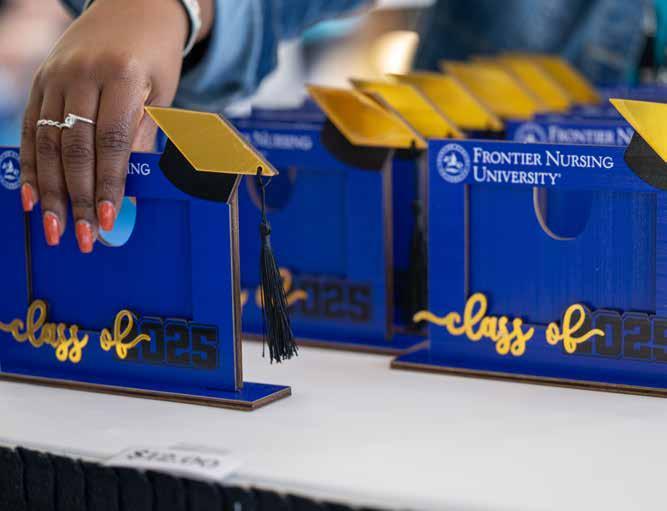


By making a recurring gift to FNU, you are investing in the lives of Frontier students year-round. Giving monthly represents an ongoing commitment to Frontier Nursing University and student achievement. When you commit to even $5 per month, your gift will help with student scholarships, DEI progrwamming, hands-on training materials, and so much more.

$5 12
12
$15 12
Visit frontier.edu/give-to-fnu/, use the enclosed remittance envelope, or scan the QR code above to make your first monthly gift today!
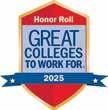
Glossary of Credential Abbreviations

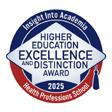
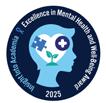
In the Quarterly Bulletin, we often list the abbreviated credentials of the healthcare professionals featured in these stories. While space does not permit a comprehensive list of all these credentials, here are a few of the more common ones used in the Quarterly Bulletin and their meanings:
CNEP: Community Based Nurse-Midwifery Education Program
CNM: Certified Nurse-Midwife
DNP: Doctor of Nursing Practice
FNP: Family Nurse Practitioner
MSN: Master of Science in Nursing
PMHNP: Psychiatric-Mental Health Nurse Practitioner
WHNP: Women’s Health Nurse Practitioner
Frontier Nursing University Quarterly Bulletin, ISSN 0016-2116, Copyright © 2025 by Frontier Nursing University, is published quarterly by Frontier Nursing University, 2050 Lexington Road, Versailles, KY 40383. Business and Editorial Offices: 2050 Lexington Road, Versailles, KY 43083. Accounting and Circulation Offices: Frontier Nursing University, 2050 Lexington Road, Versailles, KY 43083. Periodicals postage is paid at Versailles, KY, and additional mailing offices (if applicable).
Brooke A. Flinders, DNP, RN, APRN-CNM, FACNM President
Shelley Aldridge, BA Chief Operations Officer
Paula Alexander-Delpech, Ph.D., PMHNP-BC, APRN Dean of Student Success
Kristin Ashford PhD, WHNP-BC, FAAN Dean of Nursing
Marc Blevins, MS, CISA Chief Information and Digital Officer
Bobbi Silver Chief Advancement Officer
Kylie Waters, CPA, MBA Chief Financial Officer
Jenkins Michelle Lawhorn, DNP, CNM, RNC-OB, Regional Clinical Faculty (faculty representative)
Chris Turley, MS, BS Director of Student Engagement (staff representative)
Academic Administration
Audra Cave, DNP, FNP-BC Department Chair of Family Nursing
Khara’ Jefferson, DNP, APRN, FNP-C Doctor of Nursing Program Director
Laura Manns-James, Ph.D., CNM, WHNP-BC, CNE, FACNM
Interim Department Chair of Women's Health
Rachel Risner, Ph.D., DNP, APRN, C-FNP, CNE
Associate Dean of Academic Affairs
Kevin Scalf, DNP, APRN, PMHNP-BC, CNEcl, Department Chair of PsychiatricMental Health
Eileen Thrower, Ph.D., APRN, CNM, CNE, FACNM
Department Chair of Midwifery

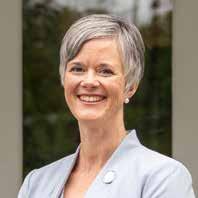
Dear Friends,
Throughout this year, we have celebrated the 100th anniversary of the inception of the Frontier Nursing Service. We have reflected on lessons learned, analyzed our present, and prepared for our future. The last few months in particular have been a whirlwind of excitement and celebration, highlighted by Commencement 2025 on September 27. We had a fantastic turnout, a remarkable speaker in Dr. Beverly Malone, and beautiful weather for our post-commencement celebration on campus.
We always anticipate our graduation ceremony with enthusiasm and joy, but this year the emotions and exhilaration were driven to an all-time high by a pair of historical events in the days leading to commencement. On September 25th, we inducted our first Frontier Nursing University Alumni Hall of Fame class. Their names and their stories -- which were shared in detail in the Summer 2025 issue of the Quarterly Bulletin -- are legendary. Pat Caudle, Kitty Ernst, Kerri Schuiling, Joan Slager, and Susan Stone are all pioneers in midwifery and nursing. It was a privilege to honor these amazing, impactful leaders and reflect on their countless accomplishments and contributions to the university.
Not to be overshadowed, that same evening we honored our Annual Service Award recipients, recognizing individuals who have made significant contributions to the university and their communities. Their stories, which we share in this issue of the Quarterly Bulletin, are inspiring examples of the impactful work of our faculty, staff, Couriers, and volunteers.
Yet another history making event was held on campus on September 26, with my investiture as Frontier’s new president. This event represented the university’s future and the shared vision to build upon the foundation laid by leaders such as our Alumni Hall of Fame inductees, longtime Board Chair Dr. Michael Carter, and many others who have shaped our path. We are fortunate to have been guided by their wisdom, their courage, and perhaps most importantly, their passion and steadfast commitment to our mission.
As we near the end of this monumental year, I am filled with gratitude for our past and anticipation of our future. We honored 13 people at our awards ceremony in September, but I know there are countless others deserving such recognition for the immense impact they have on our students and on healthcare in communities throughout the country. I thank each and every one of you for your support and contributions to Frontier Nursing University.
With gratitude,

Dr. Brooke A. Flinders
Frontier Nursing University’s 2025 Commencement ceremony celebrating the year’s 1,139 graduates was held at 11 a.m. on Saturday, September 27 at Rupp Arena in Lexington, Kentucky.
“I am deeply honored to welcome you on behalf of the Board of Directors,” said Frontier Board of Directors Chair Marcus Osborne, welcoming the graduates and their families. “We take great pride in the dedication, hard work, and perseverance that have led you to achieve your degrees or certificates.”
FNU President Dr. Brooke A. Flinders welcomed the graduates and their guests. She complimented the graduates for their hard work and dedication and thanked the families for their support and presence at commencement.
“Your graduation is a remarkable achievement,” Dr. Flinders said in her welcoming address. “You are equipped. You are prepared. And you are ready to fulfill the dreams that brought you to Frontier. We are all so very proud of you.”
FNU Dean of Nursing Dr. Kristin Ashford echoed that message of pride and encouraged the graduates to become healthcare leaders in their communities across the country.
“We are here to celebrate you, your hard work, your passion, your resilience, and your unyielding drive to make a difference in this world,” said Dr. Kristin Ashford, FNU’s Dean of Nursing. “In the journey ahead, you will face challenges. You will be asked to be more, to give more, to stand in the gap where healthcare is most needed.”
Dr. Paula Alexander-Delpech, FNU’s Inaugural Dean of Student Success, introduced keynote speaker Dr. Beverly Malone, President and CEO of the National League for Nursing. Dr. Malone’s distinguished career has blended policy, education, administration, and clinical practice, including as Federal Deputy Assistant Secretary for Health under President Bill Clinton.
“This is the opportunity to step into greatness,” Dr. Malone said, addressing the graduates. “This is the time to say, ‘What door is going
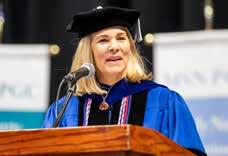
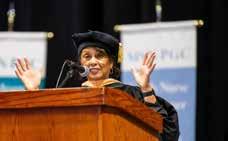
to be opened to me by this event. What is my next step? How can I step into greatness?’ Do not put blinders on yourself, do not contain yourself.
Understand that this is your opportunity, your option, to step up into greatness.”
Dr. Malone serves as vice chair at the Institute for Healthcare Improvement (IHI) Board of Directors, co-leads the National Academy of Medicine (NAM) Health Professional Education and Communication Working Group, and serves on NAM’s Steering Committee. She encouraged the graduates to remain positive and confident as they further their careers in healthcare in service to their communities.
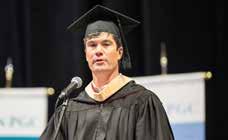
“A vision without action is hallucination,” she said. “We are nurses. We bring the hope with us. We have a self-generating mechanism of hope with us at all times.”
Following the ceremony, Frontier hosted a post-commencement celebration on theFNU campus in nearby Versailles. There, graduates showed their families around campus, visited with faculty, and took advantage of photo opportunities.
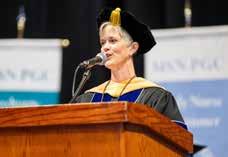
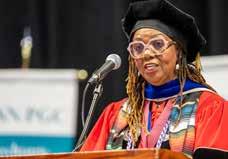
Doctor of Nursing Practice Exemplary Project Awards
This award represents quality improvement project excellence in a clinical setting by a student. The recipient is nominated and chosen by the faculty.

Dr. Kemetra King Memphis, TN

Dr. Jillian Swope Chandler, AZ
Dr. Susan E. Stone Excellence in Leadership and Student Success Award

Dr. Julia Kim Wilmington, DE
This award recognizes students who have made outstanding contributions and demonstrated exemplary leadership toward advancing Frontier Nursing University’s mission and goals, while also achieving notable academic and professional success in their educational journey.
in Leadership and Innovation Awards
These awards recognize students who have demonstrated exceptional commitment and excellence in leadership, innovation, inclusion, and the advancement of FNU’s mission

Dr. Jaclyn Piasta Marietta, GA

Andradeen Randall Seffner, FL
Each year, students select faculty members to receive awards honoring excellence in teaching in two categories: Academic Faculty (didactic) and Regional Clinical Faculty (RCF). Here are the 2025 winners as selected by the FNU students:






Rhonda Arthur
DNP, LNP, WHNPBC, FNP-BC, CNE
Women’s Health Didactic Faculty
Catherine Collins-Fulea
DNP, CNM, FACNM, FAAN
DNP Project Faculty
Jeffrey Dobbins
DNP, APRN, PMHNP, CNEcl
PsychiatricMental Health Regional Clinical Faculty
Lisa Huckaby
DNP, CMN
Nurse-Midwifery Regional Clinical Faculty
Jenkins Michelle Lawhorn
DNP, CNM, RNC-OB
Nurse-Midwifery, Regional Clinical Faculty
Angela Mitchell
DNP, FNP-BC, CNE
Family Nursing Didactic Faculty






Judith Butler
DNP, CNE, CNM, WHNP
Nurse-Midwifery Didactic Faculty
Sonya DiCiro
DNP, APRN, FNP-BC, CDCES
Family Nursing Regional Clinical Faculty
Janet Engstrom
PhD, APRN, CNM WHNP-BC, CNE
Doctor of
Nursing Practice Didactic Faculty
Sharanna Johnson
DNP, APRN, FNP-BC
DNP Project Faculty
Lillian Medhus
DNP, WHNP-BC, CNM
Women’s Health Regional Clinical Faculty
Stacie Olsen
DNP, APRN, PMHNP
PsychiatricMental Health Didactic Faculty
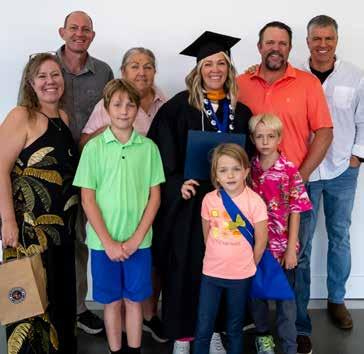
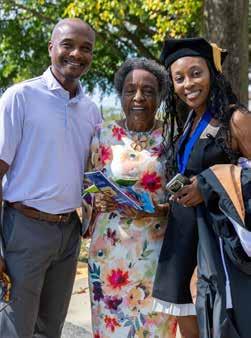
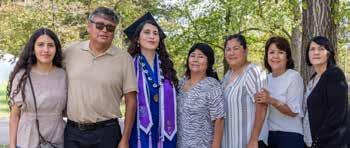
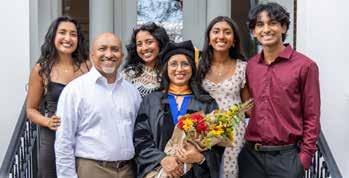
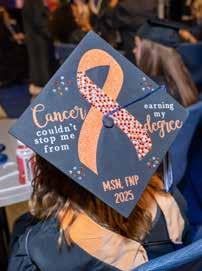
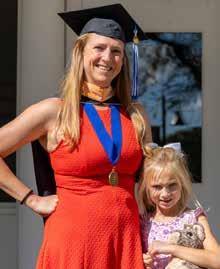
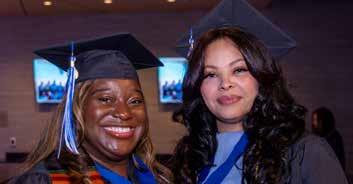

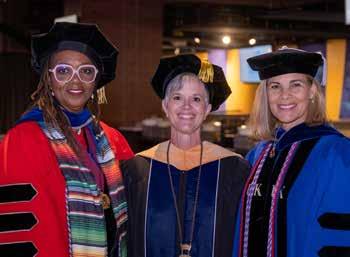
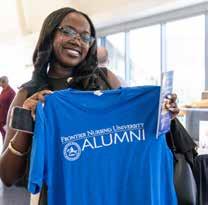
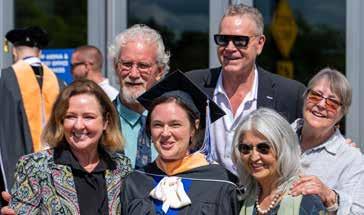
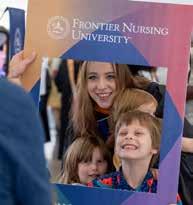
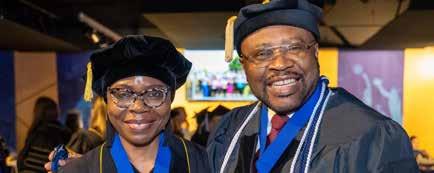
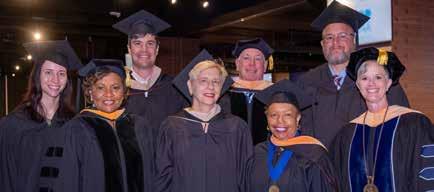
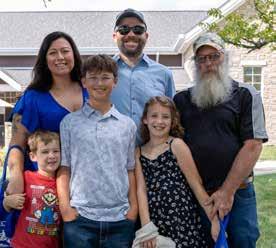
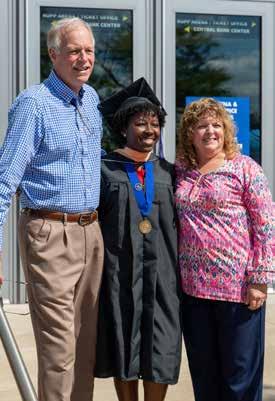
Frontier Nursing University held the investiture of Dr. Brooke A. Flinders, DNP, RN, APRN-CNM, FACNM, as the university’s second president on September 25. The event was held on Frontier’s campus in Versailles, Kentucky.
The presidential investiture ceremony is a formal event that is typically held during a new president’s first year. The ceremony signifies the beginning of a new chapter of leadership for the university, and it provides an opportunity for the university, guests, and community to witness the formal installation of the new leader.
After Frontier Chief Advancement Officer Bobbi Silver and Dean of Nursing Dr. Kristin Ashford welcomed the attendees, the event began with a land acknowledgement by Venus Evans (Mi’kmaw), a tribal citizen of the Mi’kmaq Nation and representative of the Kentucky Native American Heritage Commission, acknowledging that Versailles, Kentucky is the traditional territory of the Shawnee and Cherokee people.
Special guest speakers included:
Dr. Peter Schwartz
FNU Board member
Dr. Susan Stone
FNU President Emerita and Distinguished Chair of Midwifery and Nursing
Dr. Joan Slager
FNU Dean Emeritus
Dr. Diane John
Retired faculty and former Interim Dean
Dr. Cathy Bishop-Clark
Dean Emerita, College of Liberal Arts and Applied Science, Miami University
Dr. Joan Fopma-Loy
Professor Emerita, Miami University
Dr. Flinders delivered her inaugural address. She acknowledged the the leadership of visionaries such as Kitty Ernst and Susan Stone and the importance of building upon our strong foundation.
“Today, we must recommit ourselves to that legacy yet recognize that the crossroads between higher education and healthcare are different today than they have ever been. We will continue to face our own unique challenges, and we will navigate them in new and innovative ways,” Dr. Flinders said.
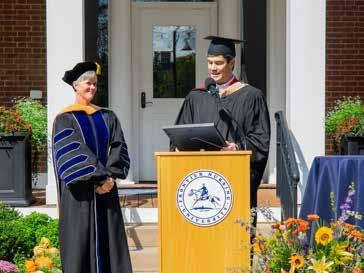
Dr. Flinders went on to outline Fronter’s 2030 strategic plan and the high-level strategic priorities that will guide the university’s efforts over the next four years:
Pillar I: Academic and Clinical Excellence. Frontier will continuously improve and strategically expand academic programs and partnerships to further the university’s mission.
Pillar II: Student Success. Frontier will focus on Access, Academic Empowerment, Retention, and Engagement.
Pillar III: Innovation, Operational Excellence, and Strategic Positioning. Frontier will advance a dynamic institutional culture to champion innovation, drive operational excellence, and promote intentional and strategic positioning.
“I recognize that today is not just a celebration of a new presidency. It is a celebration of all that Frontier Nursing University stands for,” Dr. Flinders said. “Together, we will honor our past, embrace our present,
and shape our future. Let us move forward with purpose and let us continue to be a beacon of hope, healing, and health.”
The event closed with a bell ringing ceremony led by FNU faculty members Victoria Burslem and Tonya Nicholson, and closing remarks by FNU Dean of Student Success Dr. Paula AlexanderDelpech.
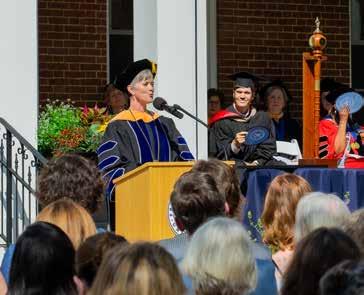
“Today we have formally invested President Dr. Brooke A. Flinders as the leader of Frontier Nursing University,” said Dr. Alexander-Delpech. “While she has been serving in this role for a year already, today’s ceremony represents the formal recognition of a commitment to Frontier and our shared vision for the future.”
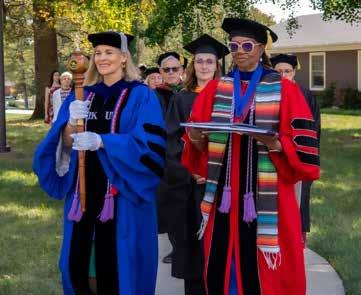
“Thank you for entrusting me to be the second president of Frontier Nursing University. It is truly my honor.”
— Dr. Brooke A. Flinders
Faculty Learning Communities offer structured, collaborative spaces where faculty engage in meaningful dialogue and professional growth, exploring best practices, addressing complex challenges, and supporting one another’s development.
To honor our new president, we have established an opportunity to donate to our new Faculty Learning Communities Endowment Fund (FLC). Dr. Flinders is firmly committed to creating sustainable structures to foster faculty development. She believes that teaching and learning are interdependent and that student outcomes are directly impacted by their educators’ effectiveness.
Our goal is to raise $100,000.
Scan this code to make a donation.
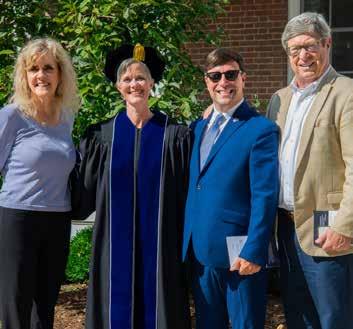
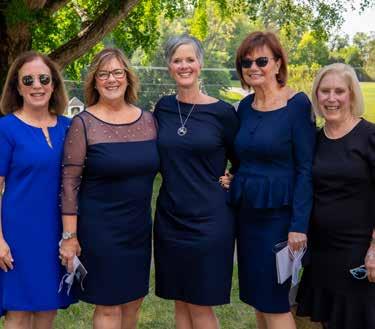
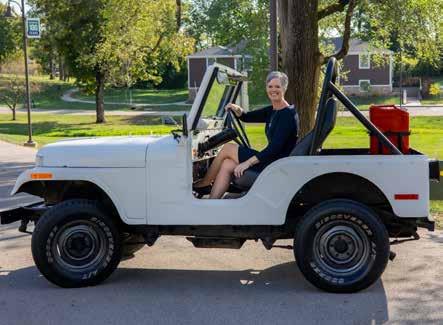
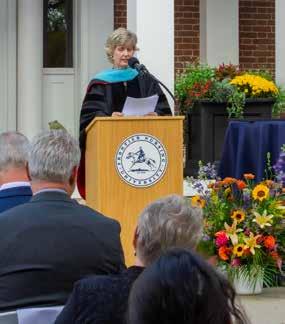
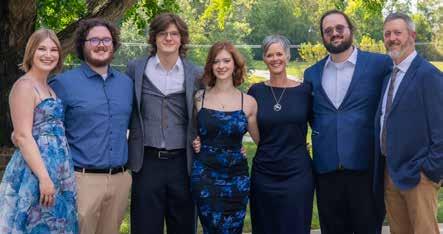
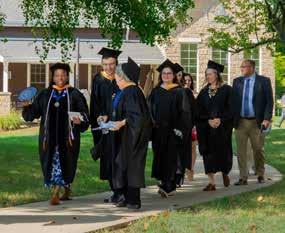
On September 25, Frontier Nursing University inducted its first Alumni Hall of Fame class at the university’s Alumni Hall of Fame and Service Awards Dinner on Thursday, September 25 at the Kentucky Castle in Versailles, Kentucky. The first FNU Alumni Hall of Fame inductees are Dr. Pat Caudle, Kitty Ernst, Dr. Kerri Schuiling, Dr. Joan Slager, and Dr. Susan Stone.
“As we celebrate the 100th anniversary of the founding of the Frontier Nursing Service, this is the perfect time to recognize some of those who are responsible for the establishment, growth and success of Frontier Nursing University,” FNU President Dr. Brooke A. Flinders said. “The five women comprising the first class of the Alumni Hall of Fame have distinguished themselves as impactful educators, pioneers, innovators, and groundbreaking leaders. Their collective passion for and commitment to the university and its mission is unsurpassed. They inspire so many of us who aspire to follow in their footsteps.”
The introduction of each of the Alumni Hall of Fame inductees included a summary of their accomplishments and contributions to
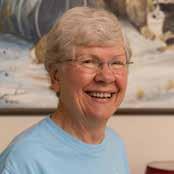
Frontier. An accompanying video further journaled their stories as told by themselves and those closest to them. Their full stories were shared in the Summer 2025 issue of the Quarterly Bulletin, which can be read or downloaded at Frontier.edu/publications.
The evening also included a celebration of the university’s annual Distinguished Service Awards. This year’s eight honorees were Victoria Burslem, Michael Carter, Cathy Cook, Torica Fuller, Eric Lakomek, Jenkins Michelle Lawhorn, Samanth Paradis, and Dorothy E. Trefts. As Board members, instructors, practitioners, and preceptors, the recipients were honored for their significant contributions to their communities, professions, and to Frontier Nursing University.
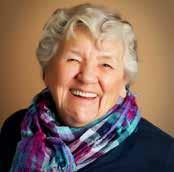

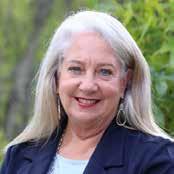
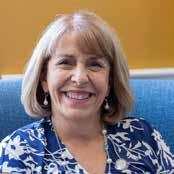
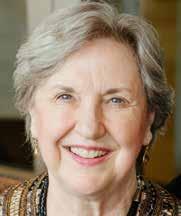
In honor of her nearly two decades of service on faculty at Frontier Nursing University, Victoria Burslem, MSN, CNM, CNE (cl), FACNM, was named a recipient of FNU’s Lifetime Service Award. The award recognizes an individual or organization providing long-standing support and commitment to the mission and work of Frontier Nursing University.
Burslem holds an undergraduate degree from Vanderbilt University and attended graduate school at the University of Illinois Chicago. She worked at The Birth Center in Wilmington, Delaware, for several years until she was invited to become an instructor at Frontier in 1989. Burslem went on to be an instructor in the Frontier CommunityBased Nurse-Midwifery Education Program (CNEP) for seven years before returning to her own full-scope clinical practice. She served in full-scope midwifery practice for over 35 years.
VICTORIA BURSLEM: Lifetime Service Award
She returned to the FNU faculty in 2015. She currently serves on Frontier’s Advanced Health Assessment and Diagnostic Reasoning faculty team and is Co-Coordinator for the Labor Skills Workshop. She is also Co-Chair of FNU’s Admissions Committee.
Burslem is a Fellow of the American College of Nurse-Midwives (ACNM) and was the 2013 recipient of ACNM’s Dorothea M. Lang Pioneer Award. She is also a member of the Sigma Theta Tau International Honor Society of Nursing.
“Receiving this recognition and honor of an award from colleagues, those who know you well and have served alongside you in the trenches through the years, is the highest professional honor one can receive,” Burslem said of the FNU Lifetime Service Award. “I receive this Lifetime Service Award humbly, for it truly does take a village, and with gratitude for the gift that the Frontier community has always been to me professionally and personally. I do not take lightly the privilege I have been given to educate and impart to the next generation of nurse-midwives and nurse-practitioners the mission, principles, and practices that Frontier holds dear.”
“These eight individuals epitomize Frontier’s mission and vision in action,” said Dr. Flinders. “We are honored to recognize them as distinguished members of the FNU community.”

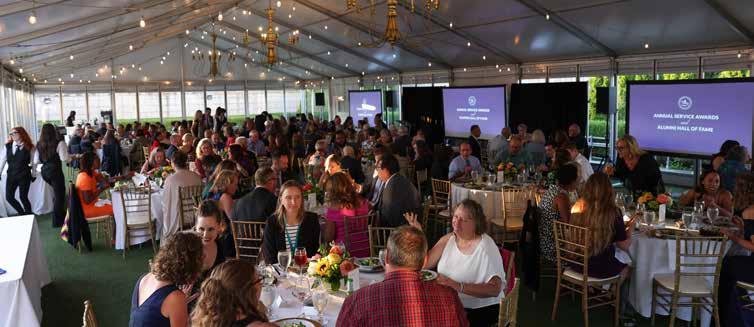
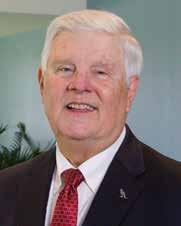
In honor of his more than two decades of service and leadership to Frontier, Dr. Michael Carter was named a recipient of FNU’s Lifetime Service Award. The award recognizes an individual or organization providing long-standing support and commitment to the mission and work of Frontier Nursing University.
Dr. Carter, who passed away in June of 2025, served as Chair of the Frontier Nursing University Board of Directors from 2009 to April 2025. Dr. Carter’s long history with Frontier Nursing University dates to 2003 when he joined what was then the Frontier Nursing Service Board of Governors. Dr. Carter’s leadership was marked by his determination, his entrepreneurial spirit, and his extraordinary passion.
“Michael was respected for his excellence as a practitioner, educator, and leader,” FNU President Dr. Brooke A. Flinders said. “He was loved for his kindness, generosity, grace, and beloved storytelling ability. Dr. Carter will be terribly missed, but always fondly remembered.”
During his more than 20 years at Frontier, Dr. Carter was instrumental in many milestone moments for the university. He was on the Board of Governors when what was then known as the Frontier School of Midwifery and Family Nursing launched the Doctor of Nursing
to Frontier Nursing University in 2011.
In 2017, under Dr. Carter’s visionary leadership, FNU made the pivotal decision to purchase property in Versailles, Kentucky, an investment aimed at expanding student access and supporting the university’s growth. That same year, FNU began taking applications for the Psychiatric-Mental Health Nurse Practitioner degree. Then, in 2022, after the completion of renovations and construction, Frontier held the ribbon-cutting ceremony officially opening the Versailles campus. Most recently, Dr. Carter initiated the successful search for and transition to FNU’s second president, Dr. Brooke A. Flinders, in 2024.
Dr. Carter was a staunch supporter of FNU over the years and provided many financial contributions to support students and FNU’s campus. In 2021, Dr. Carter, his wife Dr. Sarah Carter, and their daughter Elizabeth Carter, JD, announced a $500,000 donation to further the mission of FNU. The gift furthers Dr. Carter’s commitment and lifelong work to enrich the nursing profession across the globe.
“His extraordinary leadership was exceeded only by his wisdom, kindness, and dedication to the care of others,” said FNU Board of Directors Chair Marcus Osborne. “The debt of gratitude that is owed to him is immense.”
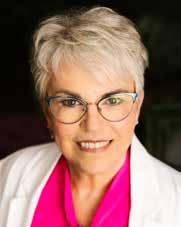
In honor of her commitment to precepting nursing students, Dr. Cathy Cook, DNP, APRN-FPA, CNM, FACNM, was named a recipient of the Distinguished Preceptor Award. The award recognizes a graduate providing long-standing support and commitment to the mission and work of FNU through precepting students.
Dr. Cook, who is a obtained her Certified Nurse-Midwife and Doctor of Nursing Practice degrees at FNU, worked as a certified nurse-midwife from 1998-2020, primarily practicing in Galesburg, Illinois. She specialized in natural childbirth and providing individualized education and prenatal care to expectant mothers. She has since received Full Practice Authority and opened her own aesthetic and hormone optimization clinic.
While maintaining this demanding career, Dr. Cook has been eager to give back as a preceptor. Preceptors are experienced licensed clinicians who supervise nursing students during their clinical practicum. In
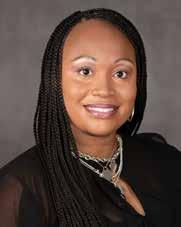
In honor of her commitment to providing healthcare to those who are uninsured and underinsured, Dr. Torica Fuller, DNP, MSN, FNP-BC, FNP-C, WHNP-BC, CDP, CGRN, CPN, NRCME, was named a recipient of the Distinguished Service to Society Award. The award is given annually in recognition of a Frontier Nursing University graduate who gives above and beyond to provide exceptional service in his or her community.
Dr. Fuller was born in Fremont, North Carolina, and now practices in North Carolina as a family nurse practitioner and a women's healthcare nurse practitioner. She works primarily in public health, caring for patients across the lifespan. Her clinical focus includes women's health, child health, preventive care, communicable disease, epidemiology and patient education. She is also a Carolina Hepatitis Academic Mentorship Program (CHAMP) provider and is the sole provider in her clinic to provide Hepatitis C Virus (HCV) treatment.
total, Cook has served as a preceptor to an incredible 270 Frontier students.
“Students teach us as much as we teach them,” said Dr. Cook, who is also on faculty at Frontier. “They help us see things through new eyes. Some of us who have been practicing for a long time may not know the newest items in healthcare. Students can teach us those things if we are open and willing to learn from them.”
Dr. Cook was previously presented with FNU’s Distinguished Service to Alma Mater award (2021), in recognition of her wide range of contributions to the university. The award specifically honors graduates who have supported Frontier through volunteer efforts and/ or donor support.
Dr. Cook’s additional awards include the Kitty Ernst Scholarship (1997), induction in the Sigma Theta Tau International Honor Society (2017), and American College of Nurse-Midwives Fellow (2022).
Dr. Fuller earned her bachelor’s degree in nursing from East Carolina University (ECU), her Master’s and FNP Post-Masters certification from Indiana Wesleyan University, and her DNP from ECU. She completed her Post-Graduate Women’s Health Care Certificate at FNU in 2023. Dr. Fuller joined FNU faculty in April 2023.
She balances her time between clinical practice and teaching to stay current and bring real-world experience into the classroom. She serves as Clinical Transition Coordinator and Assistant Professor at FNU.
“Being both a provider and an educator allows me to keep my work meaningful and impactful every day,” Dr. Fuller said. “I’m committed to lifelong learning and helping others find their path in this incredibly rewarding profession.”
In 2025, Dr. Fuller was selected by the American Association of Colleges of Nursing (AACN) to participate in the organization’s 2025 Diversity Leadership Institute.
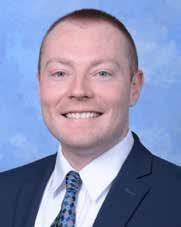
In honor of his remarkable service to community, Dr. Eric Lakomek was named a recipient of the Unbridled Spirit Award. The award is given annually to a former Courier who has perpetuated the mission and spirit of Frontier in their own lives. The award recognizes dedication to serving others, ongoing stewardship of FNU, and a zest for adventure.
In 2019, during the summer between his sophomore and junior years at Wabash College in Indiana, Dr. Lakomek was selected to participate in FNU’s Courier program. The summer program immerses undergraduate students from around the country in a public health and volunteerism internship.
“That experience was transformative,” said Dr. Lakomek, who is a first-year pediatric resident at Cincinnati Children’s Hospital Medical Center in Cincinnati, Ohio. “It gave me firsthand exposure to the challenges rural communities face and showed me how meaningful a physician’s role can be, not only in providing medical care but also in building trust and strengthening communities.”
While at Wabash College, Dr. Lakomek founded the Red Shoe Project, which is dedicated to providing sporting equipment to
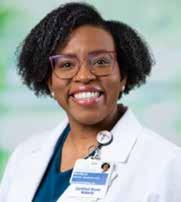
In honor of her dedicated service to her students, Dr. Jenkins Michelle Lawhorn, DNP, CNM, RNC-OB, was named a recipient of the Distinguished Service to Alma Mater Award. The award honors a nurse-midwife or nurse practitioner who has supported FNU through volunteering and/ or philanthropy.
Raised in Fort Mill, South Carolina, Dr. Lawhorn lives and works in North Carolina, where she has resided for over 20 years. She is a two-time graduate of Frontier, where she received both her master's degree in nursing with an emphasis in nurse-midwifery and her Doctor of Nursing Practice degree. As a board-certified nurse midwife, Dr. Lawhorn has provided full scope midwifery care in both the community and hospital setting. She holds additional certifications in inpatient obstetrics nursing
children and families who cannot otherwise afford it.
Dr. Lakomek graduated magna cum laude from Wabash, majoring in psychology with minors in chemistry and global health. He then attended Marian University’s Wood College of Osteopathic Medicine, where he was inducted into Sigma Sigma Phi, the honorary osteopathic service fraternity, as well as the Gold Humanism Honor Society.
During his time at Marian, he worked with underserved populations, serving in free clinics that provided essential care to those who were otherwise without access to care.
Dr. Lakomek is trained in both inpatient and outpatient pediatrics, with exposure to general pediatrics as well as subspecialty services. He manages acute illnesses, chronic medical conditions, and preventive care needs while maintaining a strong emphasis on family-centered care.
“I am deeply committed to a career in pediatrics,” Dr. Lakomek said. “I see pediatrics not only as caring for children’s medical needs, but also as advocating for their growth, development, and overall well-being. Whether through direct patient care, community engagement, or broader policy initiatives, I hope to dedicate my career to advancing equity, amplifying the voices of children and families, and making a lasting impact in the field.”
and electronic fetal monitoring and provides midwifery care at the University of North Carolina Health.
At Frontier, Dr. Lawhorn shares her extensive knowledge as Regional Clinical Faculty in the Department of Midwifery and Women’s Health. She is also the 2025 Inclusive Excellence Faculty Representative to the President’s Cabinet at Frontier.
Dr. Lawhorn gives her time and training without hesitation. Her service to the community has included starting a waterbirth program at a community hospital, volunteering through Junior Achievement to discuss midwifery with high school students and speaking at local elementary schools. She was nominated for an Excellence in Teaching Award at the University of North Carolina HealthCare in 2024.
“I enjoy supporting and teaching the next generations of advanced practice nurses,” Dr. Lawhorn said. “I just show up as myself for Frontier and my community, because that is my calling.”
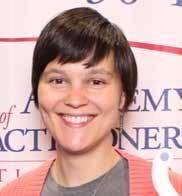
In honor of their remarkable service to community, Dr. Sam Paradis, DNP, MPH, FNP-C, CARN-AP, was named a recipient of the Distinguished Service to Society Award. The award recognizes a graduate who goes above and beyond to provide exceptional service to their community.
Originally from Aroostook County, Maine, Dr. Paradis completed their DNP at FNU in 2024, but their experience in healthcare spans the last 20 years. During that time, Dr. Paradis has provided direct care to individuals living with opioid use disorder, military veterans with dementia, LGBTQIA+ adults in rural areas, and seasonal farm workers.
“Nurturing connections with community organizations that amplify the voices of those on the margins has been at the center of my life
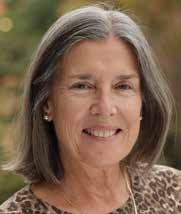
In recognition of her remarkable career accomplishments, Dorothy “Dede” Trefts was honored as the recipient of the Unbridled Spirit Award. The award is given annually to a former Courier who has perpetuated the mission and spirit of Frontier in their own lives. The award recognizes dedication to serving others, ongoing stewardship of FNU, and a zest for adventure.
Trefts grew up in East Aurora, New York, and in Shaker Heights, Ohio. She spent the spring of her senior year of high school as a member of the Frontier Nursing Service (FNS) Courier program. There, she assisted the FNS nurses, tended to the horses the nurses used to traverse the mountainous terrain in order to reach their patients, and helped in the office.
“As a seventeen-year-old high school student, I had never heard of an organization that was female-driven from top to bottom,” Trefts said. “What an eye-opening, motivating experience for a teenager to be able to witness the incredible power of women so dedicated to improving the healthcare of the population and the lives of its children in a remote county in Kentucky. It inspired me over the course of my career to have seen the huge impact that women in leadership positions could make in the lives of others.”
work,” Dr. Paradis said. “In parallel to my healthcare career, I have always maintained deep community connections, in college even being voted most likely to be volunteering.”
Dr. Paradis’ commitment to public service has led them to help establish the first public library in their hometown; serve as the first queer and youngest mayor of Belfast, Maine; become a therapeutic foster parent; and to help support the passage of Maine’s robust family medical leave in 2023.
“From caregiving for my own children and family to caring for my patients, I have been most enriched by my time spent in community with other people,” Dr. Paradis said. “Sometimes, being a witness to the challenges life presents can be the biggest gift you can give someone.”
Trefts went on to attend Wellesley College in Boston, where she majored in economics and English. She was then accepted at the Harvard Business School. Inspired by her father’s career experiences in engineering and technology, she became interested in how computers could change and improve people’s lives. Later, her career came full circle as she got involved in the acquisition of new technology and services startups into IBM Global Services and was able to utilize her background in starting new ventures to help them succeed in a large company setting.
Trefts retired three years ago but continues to enjoy serving on non-profit boards and volunteering. She has served on the boards of the Chautauqua Institution, Laurel School, her church, Arts for Healing, and Gulfstream Goodwill. She has also donated her time to mentor women and guide them as they advance their careers. Equally impactful is her commitment to mentoring women, guiding and encouraging them as they advance in their own careers.
“What matters the most to me is whether I'm making a difference,” Trefts said. “I am so honored to be remembered by an organization that was so inspirational to me as a young woman about to embark on an important step in my life.”
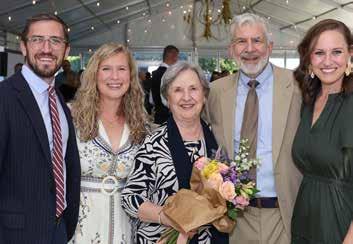
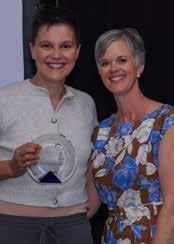
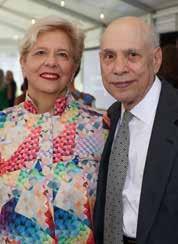
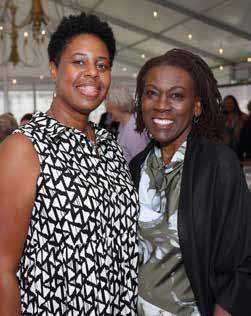
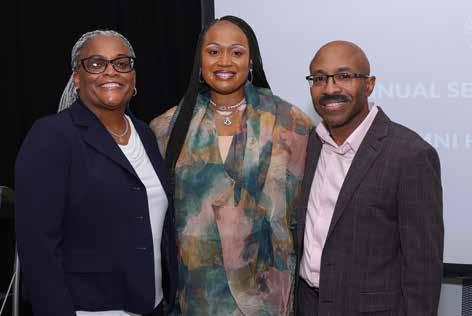
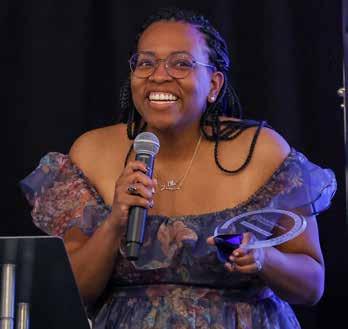
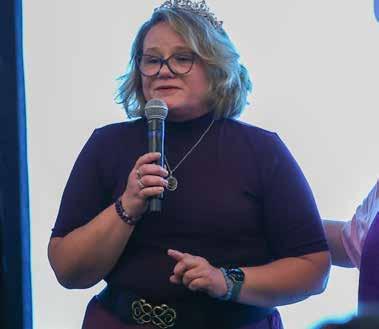
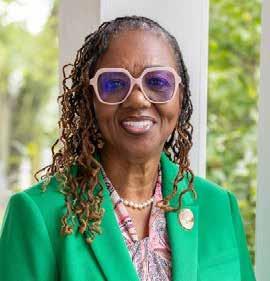
Frontier Nursing University (FNU) has established an Office of Student Engagement, Access, and Success. This strategic initiative places student success as the university's central priority while ensuring comprehensive support from enrollment to graduation and beyond.
“The development of this new office underscores Frontier Nursing University’s commitment to students,” FNU President Dr. Brooke A. Flinders said. “Frontier fosters a culture and an environment where every student is empowered to thrive and make a lasting difference.”
The Office of Student Engagement, Access, and Success consolidates critical student services under unified leadership, ensuring seamless support throughout each student's academic journey. Students benefit from integrated academic coaching and advising, mental health and wellness programs, peer-to-peer mentoring, student interest groups and accessibility services. These services are all designed to work together rather than in isolation. By centralizing these essential functions, the university creates clear pathways to success while eliminating barriers that might otherwise prevent students from reaching their full potential.
"This is not about reorganizing existing services, it's about creating a unified support ecosystem where every touchpoint reinforces our commitment to student success," said
Dr. Paula Alexander-Delpech, the inaugural Dean of Student Success. “Our dedicated team has stepped up to transform how we serve students, ensuring that from day one, every student feels genuinely supported and empowered to thrive."
FNU remains committed to its mission of providing a high-quality education that prepares nurses to become competent, entrepreneurial, ethical, and compassionate nurse-midwives and nurse practitioners. The mission can only be fulfilled through a learning environment that values every individual and honors diverse backgrounds, perspectives, and experiences.
The Office of Student Engagement, Access, and Success includes academic advising, student engagement and well-being, professional development resources, and accessibility services among other efforts to make a robust array of resources available to all students.
“We have created a seamless ecosystem for our students that goes from enrollment to graduation,” Dr. Alexander-Delpech said.
Office of Student Engagement, Access, and Success staff members track student progress, identify degree requirements, and ensure timely graduation. Additional emphasis is placed on student engagement and wellness.
“I am proud of the staff members who are working tirelessly to ensure each student is valued and supported,” Dr. AlexanderDelpech said.
Making sure that students feel valued and supported is central to Frontier’s commitment to inclusive excellence. With an enrollment of more than 2,700 students from across the country, it is important to understand and meet each student’s needs to help them succeed and be of service to their communities.
“We have a moral obligation to make sure that our students are prepared to do their job and serve their communities,” Dr. Alexander-Delpech said. “The Office of Student Engagement, Access and Success is here to meet students’ needs and to ensure that they are successful in being a Frontier student.”
Dr. Alexander-Delpech notes that the definition of success is not the same for every student. Through engagement and better understanding of students’ needs, FNU aims to have a clear picture of what success looks like for each individual.
“We put student success at the forefront of everything that we do,” Dr. AlexanderDelpech said. “It's not student support, nor is it student affairs. It is student success.”
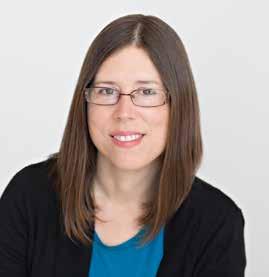
Frontier Nursing University (FNU) announced that Dr. Laura Manns-James, PhD, CNM, WHNP-BC, CNE, FACNM, has been named the Interim Department Chair of Women’s Health effective November 1.
“Dr. Laura Manns-James’s selection highlights a career built on dedication to education, mentorship, and the advancement of women’s health,” said FNU Dean of Nursing Dr. Kristin Ashford. “Her journey reflects the transformative impact of Frontier Nursing University’s mission, as she now helps shape the next generation of providers with the same passion and purpose that once guided her own path. This recognition honors not only her professional excellence but also her enduring commitment to service, scholarship, and the values that define the FNU community.”
Dr. Manns-James is a two-time FNU graduate. She first earned her certified nurse-midwifery (CNM) certificate, then completed the post-master’s women’s health nurse practitioner program. She has been a faculty member at Frontier since 2004. Dr. Manns-James holds a Bachelor of Arts from the University of Toronto in women’s studies and cultural anthropology, and a Bachelor of Nursing from St Louis University’s accelerated option. In 2014, Dr.
Manns-James was awarded the American College of Nurse-Midwives’ Foundation’s Fellowship for Graduate Education to support her doctoral work. In 2015, she received the March of Dimes graduate scholarship. She completed a PhD in nursing research in 2017.
“I am grateful for this opportunity to work with FNU leadership and our incredible, dedicated WHNP faculty to build on the solid foundation Frontier has laid for the WHNP program,” Dr. Manns-James said. “At a time when reproductive health care access is under increasing pressure, the full scope role of the WHNP in women’s and gender-related healthcare has never been more important. Our WHNP graduates are critical assets to their communities, providing care that uplifts individuals and families. I look forward to helping this department grow and thrive as we work together to meet this moment and Frontier’s mission.”
Before becoming a nurse-midwife, Dr. Manns-James worked in maternity nursing and in child/adolescent mental health. Upon graduating from FNU, she worked as a CNM in a full-scope role in southwestern New Mexico and later in Appalachian Kentucky at the Frontier Nursing Service.
Dr. Manns-James is an Associate Editor for the Clinical Practice Guidelines for Midwifery and Women’s Health (6th edition) text, published in January 2021, and a managing editor for the 7th edition, in press and scheduled for release in early 2026.
She is a Fellow of the American College of Nurse-Midwives and was honored with Frontier’s Dr. Susan Stone Faculty Award for Excellence in Diversity, Equity and Inclusion and Belonging in 2024. She received an APEX Award for Publication Excellence. Additionally, she has been a two-time recipient of the Frontier Student Choice Award for Teaching Excellence (2015 and 2023) and was selected to participate in the inaugural President’s Academic Fellowship Program at Frontier in 2025.
For the fifth consecutive year, Frontier Nursing University (FNU) has been recognized as one of the best universities in the nation to work for, according to the Great Colleges to Work For® program.
The results, released today in a special insert of The Chronicle of Higher Education, are based on a survey of 199 colleges and universities. In all, 76 of those institutions achieved “Great College to Work For” recognition for specific best practices and policies. Results are reported for small, medium, and large institutions. With more than 2,700 students, FNU is included among the small universities (500 to 2,999 students).
FNU was also named to the Great Colleges Honor Roll, a status granted to only 42 colleges each year who are highlighted most
across the recognition categories. FNU won honors in a total of nine categories:
• Job Satisfaction & Support
• Compensation & Benefits
• Professional Development
• Mission & Pride
• Supervisor/Department Chair Effectiveness
• Confidence in Senior Leadership
• Faculty & Staff Well-being
• Shared Governance
• Faculty Experience
“Being recognized as a Great College to Work For for a fifth consecutive year is an honor we do not take for granted,” said Dr. Brooke A. Flinders, President of Frontier Nursing University. “Our faculty and staff are fully dedicated to providing our students with the best possible educational experience we can. As a university, it is our duty to demonstrate that same level of caring
Frontier Nursing University (FNU) has been named a recipient of the 2025 Health Professions Higher Education Excellence and Distinction (HEED) Award from Insight Into Academia magazine, the oldest and largest diversity-focused publication in higher education. The annual Health Professions HEED Award is a national honor recognizing U.S. health colleges and universities that demonstrate an outstanding commitment to academic excellence, belonging, and community-building across all levels of campus life.
FNU was featured, along with 27 other recipients, in the October 2025 issue of
Insight Into Academia magazine. This is the eighth consecutive year FNU has been named as a Health Professions HEED Award recipient.
“We are pleased and honored to have been named a HEED Award recipient again this year,” said Dr. Brooke A. Flinders, President of Frontier Nursing University.
“We prioritize creating and maintaining a positive and inclusive environment that enables our students, faculty, and staff to flourish. We graduate over 1,000 students from across the country every year. It is our responsibility and duty to prepare these nurse practitioners and nurse-midwives to

and respect for our faculty and staff. By fostering a culture that values their voices and contributions, we strive each day to make Frontier not just a workplace, but a community where people are appreciated and empowered.”
The Great Colleges to Work For® program is one of the largest and most respected workplace-recognition programs in the country. For more information and to view all current and previously recognized institutions, visit the Great Colleges program website at GreatCollegesProgram. com and GreatCollegesList.com. ModernThink, a strategic human capital consulting firm, administered the survey and analyzed the results.
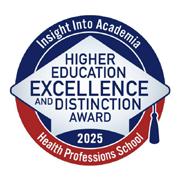
serve their communities as proficient and compassionate healthcare professionals. The comprehensive HEED Award application is a valuable tool for us to self-evaluate and identify areas in need of improvement.”
“We take a detailed and somewhat holistic approach to reviewing each application in determining who will be named a Health Professions HEED Award recipient,” said Lenore Pearlstein, Co-Publisher of Insight Into Academia magazine. “Our standards are high, and we look for institutions where academic excellence and belonging are woven into the work being done every day across their campus.”
Frontier Nursing University (FNU) has received the 2025 Excellence in Mental Health and Well-Being Award from Insight Into Academia magazine, the largest and oldest diversity and inclusion publication in higher education. The Excellence in Mental Health and Well-Being Award is a measure of an institution’s individual programs and initiatives that significantly advance the core values of inclusive excellence and belonging through programs, initiatives, and many other campus priorities deserving of this national recognition.
FNU will be featured, along with 70 other recipients, in the September 2025 issue of Insight Into Academia magazine.
“We are deeply honored to receive Insight Into Academia’s 2025 Excellence in Mental Health and Well-Being Award,” FNU President Dr. Brooke A. Flinders said.
Frontier Nursing University announced that the Department Chair of Family Nursing has been renamed the Dr. Michael Carter Chair of Family Nursing in honor of Dr. Michael Carter. Dr. Carter passed away on June 17 of this year.
Dr. Carter served as Chair of the Frontier Nursing University Board of Directors from 2009 to April 2025. Dr. Carter’s long history with Frontier Nursing University dates to 2003 when he joined what was then the Frontier Nursing Service Board of Governors. Dr. Carter’s leadership was marked by his determination, his entrepreneurial spirit, and his extraordinary passion.
“Promoting psychological safety and holistic wellness is central to who we are as an institution. We prioritize the mental and physical health of our students, faculty, and staff, recognizing that well-being is essential to teaching, learning, and caregiving.”
“Student success is fundamentally connected to well-being. When our community members feel supported mentally, emotionally, and physically, they are empowered to reach their full academic and personal potential,” FNU Dean of Student Success Dr. Paula Alexander-Delpech said. “We recognize that learning happens best when individuals feel safe, valued, and equipped with the resources they need to thrive.”
FNU offers a wide range of resources to its students, faculty, and staff, including mental health resources, dedicated counseling
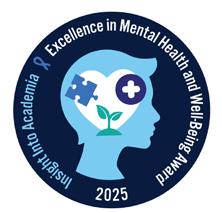
services, and wellness initiatives. Further, FNU’s Safe Space for Students initiative creates protected environments for authentic dialogue and emotional processing during challenging learning experiences.
“We know that institutions are not always recognized for their dedication to their mental health and well-being services and support for their students and employees,” Lenore Pearlstein, owner and publisher of Insight Into Academia magazine, said.
“We are proud to honor these colleges and universities as role models for other institutions of higher education.”
During his more than 20 years at Frontier, Dr. Carter was instrumental in many milestone moments for the university. He was on the Board of Governors when what was then known as the Frontier School of Midwifery and Family Nursing launched the Doctor of Nursing Practice program in 2008. Notably, he was the Board Chair when the university officially changed its name to Frontier Nursing University in 2011.
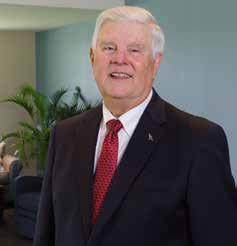
Please help us honor Dr. Carter’s legacy by donating to the Michael Carter Chair of Family Nursing Fund
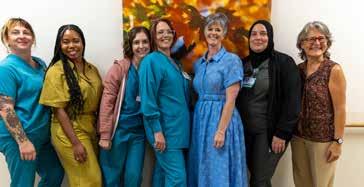
and Dr.
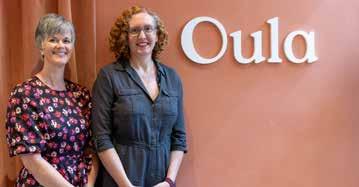
New
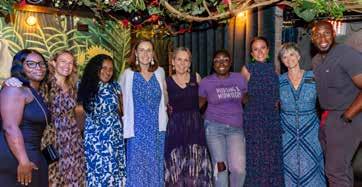
Faculty and staff connected
From August 11-15, Dr. Brooke Flinders’ Presidential Tour rolled on with stops in New York and Philadelphia. The following is a visual recap of the fun-filled and inspirational visits with the local members of the FNU community.
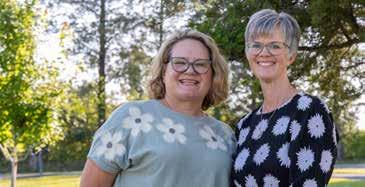
Dr. Flinders (right) visited the original "chicken coop," with Kate Bauer
Kate, who is the daughter of FNU Alumni Hall of Fame inductee Kitty Ernst, is the Executive Director of the American Association of Birth Centers, in Perkiomenville, Pa.
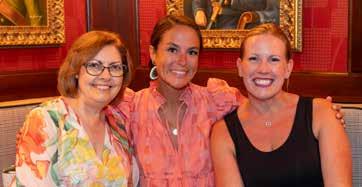
Director of Alumni Engagement Caitlin Rivard (center) caught up with members of FNU’s Philadelphia community at the Meet and Mingle, held at The White Dog Cafe.
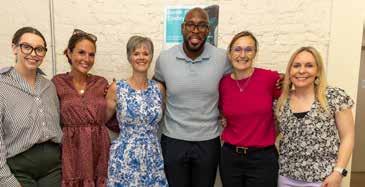
graduate Dr.
What an incredible 24 hours! Thanks to you, our Frontier Nursing University community came together in a powerful way during this year’s Day of Giving.
Together we raised $116,883 from 260 donors!
Your generosity will directly support FNU students as they prepare to serve families in their communities across the country. Every donor was able to advance our mission and ensure that the next generation of nurse-midwives and nurse practitioners are ready to provide compassionate care where it is needed most.
From all of us at FNU, thank you for showing up, spreading the word, and giving back. Your support truly makes an impact.



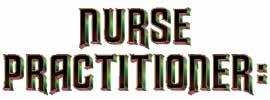

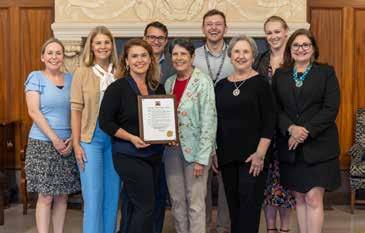
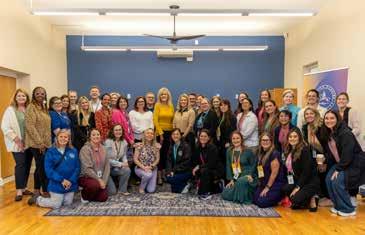
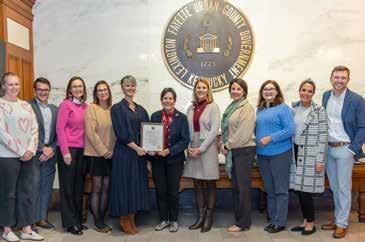
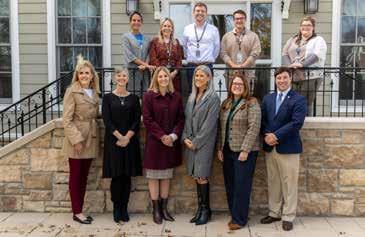
In conjunction with National Midwifery Week (October 5-11) and National Nurse Practitioner Week (November 9-15), Frontier Nursing University held its annual Virtual Events. These online events featured free educational sessions, including free CE sessions.

THANK YOU TO OUR SPONSOR!
Frontier Nursing University’s Culture of Caring focuses on how members of the university treat and value one another. Included in the five Culture of Caring tenants are respect, mutual support, positive communication, professionalism, and inclusivity. To a large degree, FNU has adopted the same caring approach to the Versailles, Kentucky, campus it calls home.
When Frontier purchased the Versailles property in 2017 and began construction and renovations soon after, it did so with emphasis on efficiency and conservation. For example, state-of-the-art heat pumps that don’t produce harmful greenhouse gas emissions were installed in 12 new and renovated buildings to improve air quality.
place, and we are enthusiastic about sustainability.”
Capley has extensive knowledge and experience in organic gardening and tries to avoid the use of any sprays or chemicals, unless necessary.
“It’s the soil. When you have good soil, you don’t have to intervene,” said Capley, who previously worked on a sustainability committee in New Orleans and at the University of Kentucky’s arboretum. “What I personally can do for campus is to try to plant more native plants and add pollinator strips along the trail. We are developing the trail with all native plants, taking out the honeysuckle and invasives.”
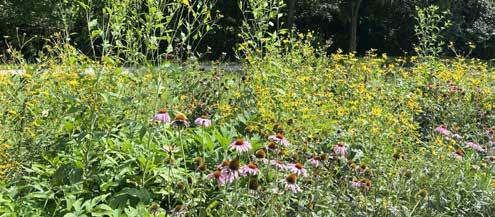
Led by the university’s Environmental Stewardship Committee, Frontier also implemented “no mow” zones, established a 5K walking trail, and strategically planted native plants while removing invasive flora.
Frontier’s rural setting requires constant upkeep and maintenance of the 217acre grounds by the five-person facilities staff. Additional support comes from the Environmental Stewardship Committee, which is a subcommittee of the Wellness and Sustainability Committee, and FNU leadership, including the Board of Directors.
“Our leadership has been great,” said Susan Capley, Horticulturist and Groundskeeper Lead. “This has always been a very positive
maintenance of the trail, FNU has put out two pollinator strips with a total of 700 native flowering plugs.
“The pollinator strips are the most active and positive plantings that we’re doing besides beautification on main campus,” Capley said. “This year we have two different types of milkweed, which would be for the monarchs, and we also have some Indian grass, which also feeds the turkeys — we have a large turkey population. We’re developing that whole area behind the faculty house as a bird sanctuary. We’re putting in a native grass that will make a nice nesting area for ground birds.”
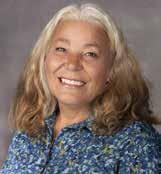
Susan Capley, FNU Horticulturist and Groundskeeper Lead
True to a university setting, Capley also utilizes the beauty of the walking trail to serve as an educational experience as well. She prints and posts signs along the trail to help identify some of the flora.
“I put out interpretive signs about what the plant does for the environment. I try to put in what’s medicinal attribute of that plant too because we are nursing school,” Capley said. “I just want to keep developing the trail. It is beneficial and cost effective and everybody enjoys it.”
Everyone also enjoys the cherry tomatoes that are grown on campus during the summer months for the salad bar in the dining hall.
“My goal is to grow vegetables for the salad bar,” Capley said.
A sustainable solution for campus garbage is also on Capley’s wish list. Some measures are already in place, including worm composting with tea and coffee grounds used to feed the worms.
While there is always room for improvement, perhaps the most important aspect of being sustainable is sustaining the current initiatives and building on them over time.
“I think everything should be sustainable,” Capley said. “It’s the right thing to do.”
By: Janet L. Engstrom, PhD, APRN, CNM, WHNP-BC, CNE
Anne Z. Cockerham, PhD, APRN, CNM, WHNP-BC, CNE
Joanne M. Keefe, DNP, MPH, APRN, FNP-c, CNE
The centennial of the founding of the Frontier Nursing Service (FNS) offers the opportunity to reflect on the work of the nursing service and celebrate what was accomplished by the nurses and the community they served. Despite living and working in one of the most rugged, remote, and impoverished areas of the United States, their collaborative efforts significantly reduced maternal and infant mortality to lower than state and national rates. Their work also significantly improved child health and well-being, and the overall health of the community. Exploring how the nurses and their community accomplished these remarkable outcomes offers valuable lessons for health care providers today. This article reviews how the FNS built relationships and trust with the community and how together they created an effective and successful healthcare organization and university. .
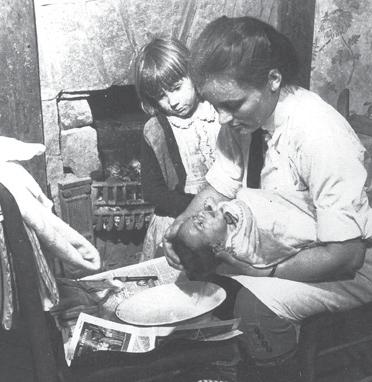
When the FNS decided to settle in Leslie County, the organization had to carefully build relationships and trust within the community. The process began by surveying the area to determine the existing health needs and resources. Mary Breckinridge spent the summer of 1923 riding through the most remote areas of the mountains, meeting families, talking to people about their health needs, and speaking with the local midwives who served the local families. Two years later, another survey was conducted to obtain a current census of the county and determine baseline birth and death rates. Two nurses were part of the survey team and although their job was to complete the census, the head of the survey team noted that “it was perfectly wonderful how they managed to give advice, bandage sores, bathe wounds . . . while traveling rapidly from one house to another gathering statistics.” This early demonstration of the nurses’ willingness to provide care regardless of the circumstances laid the foundations of trust in the community. Indeed, community members offered land, lumber, and labor to bring more nurses into the area.
Another important step in connecting with the community was to create the Kentucky Committee for Mothers and Babies to establish a plan for how to reduce maternal and infant mortality and improve public health. Once the plan was formalized, the next step was to develop the first local committee in Hyden where the nurses would begin their work. The local committees would be responsible for the nursing center in their area and play an important role in the operation of the center. This decentralized approach allowed community members to tailor the work to meet the needs of their area.
After the committees were established, the FNS rented a building in Hyden to use as a clinic. The nurses planned to begin gradually, focusing first on converting the building into a clinic. However, many people came to the clinic and sought home visits to care for illnesses, injuries, and pregnancies. At the end of their first month the two nurses had completed 561 visits for 233 patients and attended four births. Once the Hyden nursing center was established, the FNS needed to build district nursing centers to meet the needs of people in the more remote parts of county. The building of the district nursing centers required extensive collaboration between the FNS and the community. A community had to commit to building and supporting the nursing center and donate the land, materials, and labor for the center’s construction.
The first district nursing center was built at Beech Fork in 1926. Two nurses, Gladys Peacock and Mary Bristow Willeford, were assigned to oversee the construction of the nursing center. The nurses protested the assignment, stating that they knew nothing about construction, but Mary Breckinridge told them that they would learn. When they arrived at the construction site the first day, the man in charge asked them what they wanted to do about the sills, the wooden beams that serve as the foundation of a building. Neither nurse knew what sills were, but Willeford respectfully asked the man what he would recommend doing about the sills. He told them how the sills should be positioned on the land, the type of lumber that should be used, and where they could locate the lumber. For every decision thereafter, the nurses responded with the same respectful, ‘And what would you suggest Mr. Hoskins”. The builder had to have known that the nurses had no knowledge of construction, but he walked them through the process, teaching them about construction and preparing them to build four more nursing centers. The ‘learning’ that Breckinridge had promised the nurses was achieved by the nurses’ respectful acknowledgment of community members’ expertise and acceptance of their guidance.
Beyond the work of building the nursing centers and volunteering to serve on the local committees, community residents were often called upon to help the nurses transport sick or seriously injured patients to the hospital. Such transport often entailed carrying the person down or over a mountain using a makeshift stretcher or putting someone in a boat and rowing the boat to the hospital. Since the nurses always stayed with the patient, the local people would take care of the nurse’s horse and move their horse from one location to another so that the nurse would be able to continue with her work or return home once the patient was stabilized.
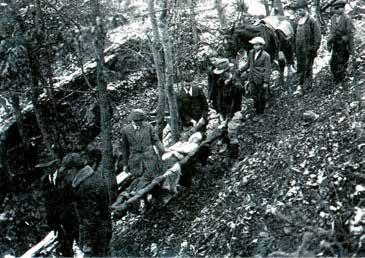
men carrying a person down the mountain. Extra men always came along so that the work could be shared by several people. Note the nurse alongside the patient and her horse being led behind the group.
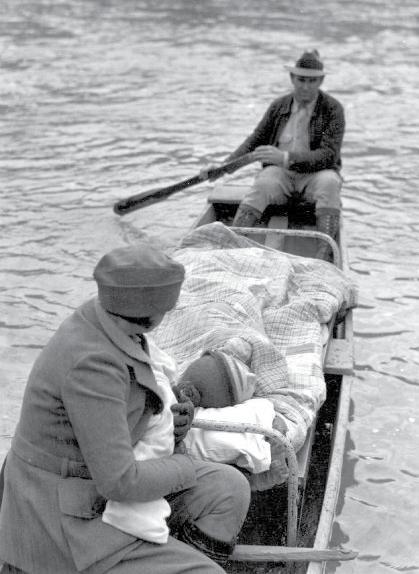
A major challenge for the FNS nurses was building enough trust with the community so that they would accept unfamiliar treatments such as vaccines. At the time, typhoid and diphtheria outbreaks were common and both were important causes of illness and death in children and adults. When there was an outbreak of typhoid fever in one community, two nurses were sent to the area to vaccinate as many people as possible. Although the community members had already gathered when the nurses arrived, no one stepped forward to receive the injection. Finally, one brave man understood the dilemma and stepped forward to be vaccinated and then brought his children to the nurses to be vaccinated. Everyone else followed. The next day the nurses administered as 140 vaccines and by the end of the week, the entire community was vaccinated.
While many people welcomed the nurses’ care for illnesses and injuries, some were reluctant to use the FNS nurse-midwives to attend their birth. Families often had pre-existing relationships with the local midwives and continued to have them attend their births. However, the local midwives did not provide prenatal, postnatal, or infant care, so the FNS nurses provided these important services regardless of who would attend the birth. During the first year of the service, the nurses attended only 30 births, and it would take several years to before they attended most of the births in the area.
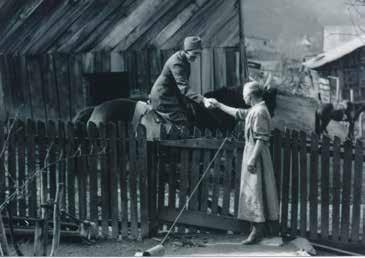
FNS nurse-midwife speaking with one of the local, community-based midwives
Another important way of building trust in the community was to demonstrate respect for the local people’s tradition and wishes, which sometimes conflicted with the standard nursing procedures. When one nurse was attending a woman during labor, a chicken kept jumping on the woman’s bed. When the nurse tried to ‘shoo’ the chicken off the bed, the mother asked the nurse to let the chicken stay because the chicken gave them an egg every day. Eggs were an important part of the mountaineer’s diet, so the chicken stayed and laid her egg, and then the mother gave birth to a healthy baby.
Many families supported the work of the FNS by allowing people from outside their community access to their lives for the purposes of documentation, marketing, and fundraising. Since much of the money needed to run the FNS came from donations from outside of the mountains, the stories of the nurses’ work and the people they served had to be told and shown to the outside world. Thus, families were asked to allow people from the outside to visit their homes, eat dinner with the family, and even sleep in their home. The families allowed their stories and pictures to appear in magazines, books and films. The sharing of their personal lives as well as their space with visitors was a great gift as many families sacrificed their privacy, their limited food sources, and precious space in their small homes.
Another demonstration of trust was when Nurse Mary Bristow
Willeford collected research data for her dissertation. Willeford surveyed families in the FNS service area asking personal questions about all sources of income and every type of health-related expense. Such questions could only be asked and answered because Willeford had worked and lived among the families and was a trusted nurse and community member.
The bond between the nurses and the local people extended beyond professional care; it was a relationship rooted in mutual trust and shared survival. The nurses took care of the people in the community by providing essential health services, and the community took care of the nurses, the administrative staff, the animals, equipment, buildings, and properties. Local families assisted the nurses in numerous ways, guiding the nurses to a patient’s home during the night, offering shelter in bad weather, or helping a horse with a problem. Although the families had limited space and resources, they would invite the nurse to share their meal, feed their horse, make room for a nurse to stay overnight if needed, and sometimes giving the nurses handcrafted items.
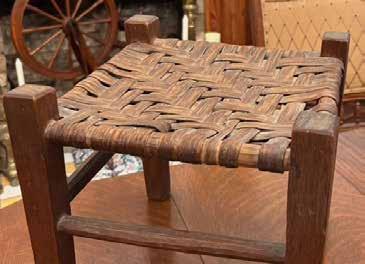
One particularly challenging problem for both the nurses and families was floods, which could make travel difficult to impossible. One day a flood kept Gladys Peacock and Mary Bristow Willeford from seeing their patients. However, a man knocked on their door to tell them that his wife was in labor. Although his wife had sent him, he told the nurses that he didn’t think they should come because the trip was treacherous. But the FNS rule was that if the husband could get to the nurse, the nurse would get to the mother. And, the nurses wanted to go, they had been seeing the woman for prenatal care and wanted to assist her at birth. The weather prohibited travel by horse, so they set off on foot with the man carrying their saddlebags. Over the next three hours, they walked six miles across newly plowed fields that were knee deep in mud, traversed a rustic swinging bridge swaying above the tumultuous river, and climbed a steep
mountainside using tree branches and roots to pull themselves up. When they arrived, they were wet, muddy, their sleeves were ripped, and their arms were scratched. But when they went into the cabin the mother smiled and told them she knew that they would come. The nurses quickly prepared for the birth, and minutes later, a daughter was born and named Mary Gladys after the nurses.
Community members also became an essential part of the FNS workforce, working alongside staff who came from elsewhere. The local people provided essential services such as cooking, cleaning, laundering, caring for the animals and buildings, maintaining equipment and properties, and every other task that needed to be done, enabling the nurses to do their work. Although the skills of the mountaineers were essential, it was also their knowledge of the land, the people, and the animals that kept the nurses safe and made the organization successful.
FNS nurses often developed friendships with community members, The nurses lived and worked centers in the community and were well known to their neighbors who not only received care from the nurses but also watched their comings and goings on their visits to families. As neighbors, the nurses might stop to chat with someone along their route about their health or the weather or who had a baby. FNS Nurse Della Int-Hout, known as Inty, frequently stopped by to visit an older neighbor who was unable to travel to the nursing center. The woman did not believe in germs because she could not see them and Inty had been unable to persuade her otherwise. One day the woman’s granddaughter came to the nursing center to ask for a pair of ‘old-age’ glasses for her grandmother. Inty put several pairs in a shopping bag and told the girl to tell her grandmother to try on each pair and then attempt to thread a needle so she would know which pair was best. When the girl returned with the leftover glasses she told Inty that her grandmother was very pleased with the glasses and had told the girl to tell Inty that she ‘can now see a germ’.
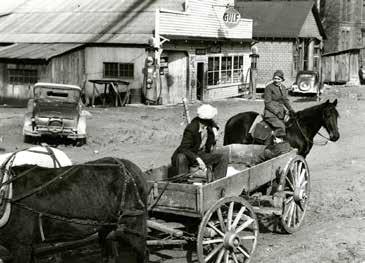
Probably the greatest testament to the FNS nurses’ and staff members’ connection to the community is staff members’ decisions to remain in the area after retirement or be buried there. Mary Breckinridge, the founder of the Frontier Nursing Service built her home and settled in the community in 1925 and stayed until her death in 1965. Betty Lester, a British nurse-midwife worked for the FNS for her entire career and then lived at the bottom of Hospital Hill until her death. Lucille Knetchly was Mary Breckinridge’s secretary for 14 years and after her retirement lived on Hospital Hill for the remainder of her days. Two nurses chose to be buried in the area after their deaths, Dorothy Buck and Ann MacKinnon were both buried in a small cemetery at Wendover.
The FNS stayed in their original Eastern Kentucky community far longer than many other independent visiting nursing services remained in their communities. Although the FNS provided nursing services in the community for 86 years, changes in healthcare and market forces led to the closure of the nursing service in 2011. After the closure of the nursing service, Frontier Nursing University leaders worked to remain in the Eastern Kentucky community, but the challenges became insurmountable with providing enough student and faculty housing, proximity to airports and expressways, and the need for larger modern facilities to provide optimal student learning experiences. It was with a heavy heart that university leaders decided to leave its Eastern Kentucky neighbors, buildings, and properties to resettle in Versailles, Kentucky. Rightfully, the FNS deeded the original buildings and properties to the community that helped build and maintain them for almost a century.
Although the experiences of the original FNS nurses and staff in its original location can never be replicated, the experiences of the nurses and their community live on in the stories of the Frontier Nursing Service. Those stories provide inspiration and guidance to current students and faculty on how to enter a community, build relationships and trust, and create a nursing practice that meets the unique needs of the community. Although modern students no longer face the rugged and remote environment that the early nurses confronted, current students face different challenges and new frontiers in healthcare. The stories of the past also inform the university on how to resettle in its new community and build relationships with its new neighbors. Finally, the stories of the FNS constitute a remarkable part of American nursing history and should be told as an example of the very best that nursing has to offer and what can be accomplished when nurses work closely and respectfully with the community they serve.
The American College of Nurse-Midwives (ACNM) 70th Annual Meeting & Exhibition was held at the Palm Springs Convention Center in Palm Springs, California on October 13-15. Frontier Nursing University was extremely well represented with an exhibit space and numerous faculty, alumni, students, and staff in attendance.
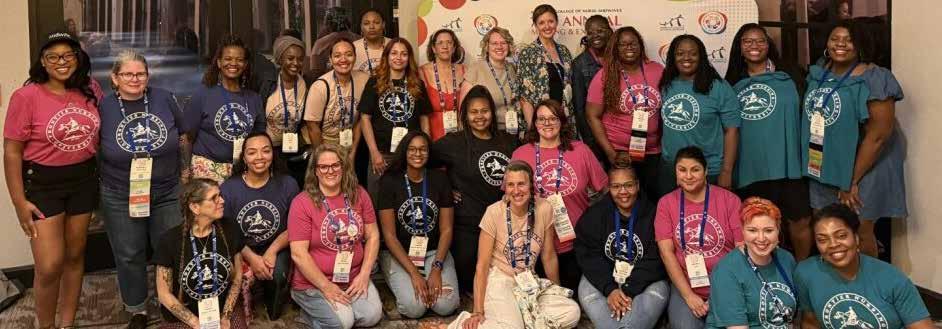

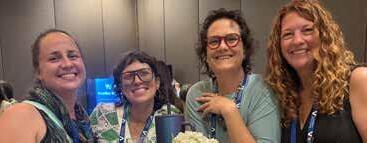
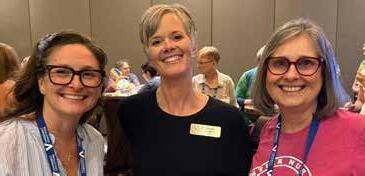
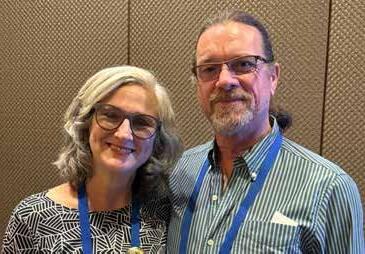
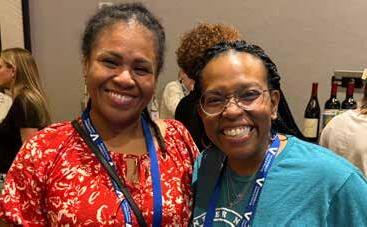
FNU President Dr. Brooke A. Flinders and Chief Advancement Officer Bobbi Silver visited with members of Wendover’s Board of Directors in Leslie County, Kentucky, in July to maintain connection with Frontier’s original home.
“It’s important to us to stay connected with the wonderful community members who cherish Wendover and its rich history,” said Bobbi Silver, FNU Chief Advancement Officer. “Our visit was truly inspiring, and we were deeply moved by the heartfelt care and dedication these leaders bring to preserving this special place.”
The history of what is now known as Wendover Bed & Breakfast dates to 1925 when Mary Breckinridge, founder of the Frontier Nursing Service (FNS), built the original log home known as the Big House. The historic headquarters of FNS, the Big House became a National Historic Landmark in 1991. FNU donated Wendover to Leslie County Betterment, Inc., in 2021 after Frontier moved to its current location in Versailles, Kentucky. The value of the donation was estimated at just under $2 million. Wendover Board members have been invited to tour the Versailles campus and join FNU leadership for lunch.
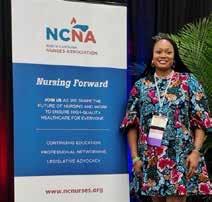
FNU graduate and assistant professor Torica Fuller, DNP, MSN, FNPBC, FNP-C, WHNP-BC (Class 217), CDP, CGRN, NRCME has been accepted as a Fellow of the Academy of Diversity Leaders in Nursing. Dr. Fuller will officially be inducted on December 12 at the New York Academy of Medicine. The academy selected Dr. Fuller in recognition of her “demonstrated leadership, commitment, and contributions to advancing justice, equity, diversity, and inclusion in nursing, health, and healthcare.”
Dr. Fuller was also recently elected and sworn in as the Chair of the Commission on Advanced Practice Nursing at the North Carolina Nurses Association (NCNA). Additionally, her abstract
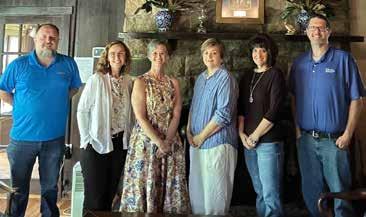
Operations
Combs, Wendover Secretary Amy Pennington,
Joel Brashear.
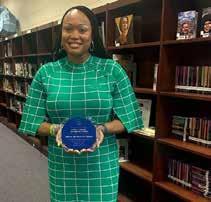
was accepted to be presented at the NCNA’s 2026 Nurse Practitioner Spring Symposium. The abstract is entitled Mental Health in Primary Care: Recognizing Unipolar versus Bipolar Depression.
Dr. Fuller received further recognition when she received the 2025 J.H. Carney Leadership Award. The award recognizes graduates of Norwayne High School (North Carolina) for their “outstanding leadership, community service, and alumni work.”
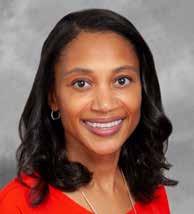
FNU DNP Program Director Dr. Khara’ Jefferson, DNP (Class 21), APRN, FNP-C, CHC, was recently selected to serve on the National League of Nursing’s (NLN) Outcomes and Competencies for Graduates of Nursing Programs Strategic Action Group (SAG). Dr. Jefferson was one of 18 individuals selected from a pool of over 300 applicants.
SAG members were selected based on their academic nursing expertise, previous work in developing outcomes and competencies, and alignment with programs across the continuum from practical/ vocational nursing, prelicensure registered nursing, MSN, DNP, and PhD programs.
SAG members will continue their work through December 2026 with public dissemination in 2027. This work group will update the NLN’s 2010 outcomes and competencies with a focus on nursing education of the future.
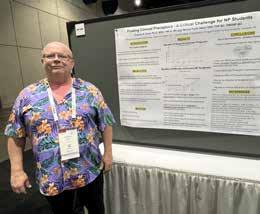
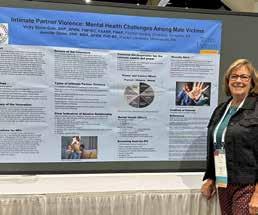
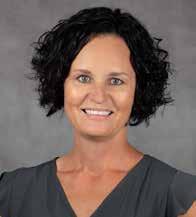
Frontier Nursing University was well-represented at the 2025 American Association of Nurse Practitioners Conference. In addition to having a booth at the conference, FNU personnel were accepted to share two poster presentations. FNU graduate Charles Davis, Ph.D., MSN, FNP-C (Class 71), RN and FNU graduate and faculty Nancy
Pesta Walsh, DNP (Class 3), FNP-BC, PMHNP-BC presented “Finding Clinical Preceptors – A Critical Challenge for NP Students”. Associate Professor Dr. Vicky Stone-Gale, DNP, APRN, FNP-BC, FAANP, FNAP presented “Intimate Partner Violence: Mental Health Challenges Among Male Victims”.
The following four Frontier Nursing University students were among the 32 recipients of 2025 American Association of Nurse Practitioners (AANP) scholarships:
• Tiffany Hinds Alexandre, WHNP, Class 199
• Rebekah L Bavry, FNP, Class 213
• Hannah Root, FNP, Class 211
• Amanda Younger, DNP, Class 52
AANP is the largest professional membership organization for nurse practitioners of all specialties. APRN, FNP-BC, FAANP, FNAP presented “Intimate Partner Violence: Mental Health Challenges Among Male Victims”.

Alicia Blaufuss
Alicia Blaufuss, APRN, MSN, CNP, PMHNP (Class 208), recently joined Essentia HealthWahpeton in Wahpeton, North Dakota. She offers psychiatry and mental health services.

Sarah Bradbury Published in Birth
Sarah Bradbury, DNP (Class 31), ARNP, CNM (, was one of the authors of Consensus Guidelines for Intermittent Auscultation in United States Community Birthing, a paper accepted for publication in the journal, Birth. Bradbury specializes in obstetrics and gynecology at Broadlawns Medical Center in Des Moines, Iowa.
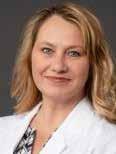
Accepted for Symposium Presentation
Helen Cornell, DNP (Class 52) was accepted to present her abstract, “Effective Care in Patients with Lower Extremity Ulcerations in a Rural Outpatient Wound Clinic”, at the Symposium on Advanced Wound Care held on September 3.

in
“Improvements to out-of-hospital cardiac arrest and opioid overdose treatment algorithms to enhance positive outcomes” by Charles Davis, Ph.D., MSN, FNP-C (Class 71) was recently published in the peer-reviewed Emergency and Critical Care Medicine
Dr. Davis also attended the 2025 Association of Diabetes Care & Education Specialists annual conference, held in Phoenix. There, he presented “Improving School Nurses' Competencies Through Focused Certification: A Concept Proposal.” .

In July, Katherine Frey, PGC-WH (Class 146), opened BirthPrint in Elizabethtown, Pennsylvania. BirthPrint offers free consultations and paid educational services and aims to support expecting families in understanding their options, voicing preferences and preparing with confidence, according to an announcement of the business opening.
BirthPrint provides education tailored to each family’s goals and values, according to its website, acknowledging that everyone’s ideal birth is different — whether that’s a hospital birth, a home birth or a water birth.

Samantha Gilman, APRN-CNP, MSN, WHNP (Class 206) recently joined the department of medicine at the Charleston Area Medical Center in Charleston, West Virginia. She is certified by the American Nurses Credentialing Center as a women’s health care nurse practitioner.

LeAnn Gordon, DNP (Class 60), MSN, FNP, recently joined Southern Tennessee Obstetrics & Gynecology in Pulaski, Tennessee. She is a member of the American College of Nurse-Midwives, the American Academy of Nurse Practitioners and Sigma Theta Tau International Honor Society of Nursing.

TriState Health in Clarkston, Washington, announced that TriState Obstetrics will open this Fall. Andrea Hedrick, MSN, CNM (Class 58), will work with an OB/GYN to perform routine exams, offer family planning assistance, and pregnancy care.

In July, the American Academy of Nursing selected Tracy Hicks, DNP (Class 23), MBA, APRN, FNP-BC, PMHNP-BC, CARN-AP, FIAAN, FAANP, as a Fellow. This honor recognizes nurses whose careers have demonstrated significant, sustained, and outstanding contributions to the profession and health care. Hicks is an assistant dean of professional development at The University of Texas at Tyler School of Nursing.

In September, Jessica Mills, MSN, CNM (Class 101), opened Nightingale Birth House in Manchester, New Hampshire. The ribbon-cutting ceremony drew community support with attendees including the mayor and local legislators.

Joins Memorial Hospital and Manor Memorial Hospital and Manor in Bainbridge, Georgia, recently added Maria Mock, CNM, DNP (Class 18), to its Magnolia Women’s Center. Mock specializes in pregnancy care and labor and delivery.

Jamie Ott, MSN, CNM, DNP (Class 33), recently joined Reedsburg Area Medical Center in Reedsburg, Wisconsin. Her areas of focus include prenatal care, labor, and birth.

Susan Pantano, DNP (Class 22), CNM, LM, opened Vibrant Wellness Midwifery this summer. Located in Plattsburgh, New York, Vibrant Wellness Midwifery offers home birth and wellness care, prenatal care, birthing care, postpartum care, well exams with screenings, such as pap smears and mammograms, infection testing and treatment, birth control, teen care, perimenopause and menopause care, education sessions, and telehealth.
Parobek Receives AANP
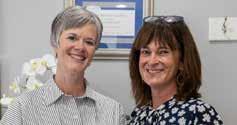
Dr. Marli Parobek (right) with FNU
President Dr. Brooke A. Flinders
Marli Parobek, DNP (Class 32), APRN, FNP, PMHNP, received the 2025 State Award for Outstanding Contributions from the American Association of Nurse Practitioners. A practitioner in Vashon, Washington, Dr. Parobek was recognized
for bringing first-rate nursing through a commitment to her patients, mentoring the next generation of professionals, and contributing to health care policy in the state.

April Phillips
Joins George Fox University
April Phillips, MSN, DNP (Class 20), recently joined the faculty at George Fox University as the director of the psychiatric-mental health nurse practitioner program, which is scheduled to launch in 2027.

Brittany Pierson, MSN, CNM (Class 205), recently joined the obstetrics and gynecology unit at Baptist Health Medical Group in Richmond, Kentucky.

Amber Reidt
Joins Winona Health
Winona Health in Winona, Minnesota, recently welcomed Amber Reidt, MSN, CNM (Class 204). She sees patients in the women’s health care department, providing care for women during normal pregnancy, labor, delivery, and post-partum care. She provides care across all stages of a woman’s life, including adolescence, pregnancy, perimenopause, and menopause.

Welcomes Lisa Shoemaker
Lisa Shoemaker, MSN, CNM (Class 200), recently joined Harris Regional Hospital and will see patients at Harris Women’s Care in Sylva, North Carolina. Shoemaker previously worked Harris Regional’s New Generations Birthing Center.
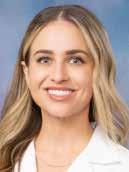

Margery Dell
Smith and Kimberly Couch
Published in Journal
FNU graduate Margery Dell Smith, DNP (Class 51), FPN-C, and FNU DNP
Course Coordinator
Kimberly Couch, DNP, CNM, FNP-BC, were published in The Joint Commission Journal on Quality and Patient Safety. Their submission, Improving Screening for Alpha-1 Antitrypsin Deficiency in Adults with COPD, concluded that “Utilizing standard of care can aid in disease prevention and prevent progression with early identification of patients with AATD. Suggested next steps include lengthier studies to evaluate the carriers and their offspring.” Dell Smith is a nurse practitioner at Onvida Health Transitional Care Clinic in Yuma, Arizona. .

Joins Milligan University
Milligan University in Milligan, Tennessee, recently welcomed Cassie Swayne, MSN, CNM (Class 200) as an assistant professor of nursing. Swayne also works as a certified nursemidwife at HMG Seasons for Women.

Saira Ugarte, APRN, CNM (Class 204), recently joined Southwest Medical Center’s Knudsen Clinic for Women’s Health in Liberal, Kansas. A Southwest Medical Center employee since 2014, Ugarte has previously worked in the organization’s obstetrics unit.

Medical
Hunter Family Medical Clinic in Rock Springs, Wyoming, welcomed Calie Wilson, MSN FNP-C (Class 204) to their team. Wilson provides primary care for all ages from newborns to adults, with an expertise in women’s health.

The Frontier Nursing University Office of Alumni Relations is here to support YOU! Our purpose is to offer helpful programs and services that support our graduates. Alumni are an integral part of FNU’s development because you demonstrate the excellence of FNU in everyday practice. You are also our primary recruiters and most loyal donors. We deeply appreciate your commitment to FNU.
The Alumni Association is open to all graduates of FNU. We currently have more than 8,000 alumni in all 50 states and many countries around the world. We encourage you to explore the services, programs, and activities offered and become involved. There are several ways to stay in touch with friends and connect to FNU, including conference receptions, case days, e-newsletters, and the FNU Alumni Facebook Group. Please ensure we have your most recent contact information to take advantage of all member services. Email us at alumniservices@frontier.edu.
To make sure you don’t miss communications such as the Quarterly Bulletin or our monthly e-newsletters, please take a moment to make sure we have your updated contact information. Please send your updated contact information, including your preferred email address, phone number, and mailing address, to alumniservices@frontier.edu. Thank you!
The 2025 Frontier Courier Program Public Health Internship welcomed eight college students with an interest in public health. This year’s program began with a three-day orientation on the FNU campus, followed by a three-week virtual learning session. During the final four weeks of the program, Couriers went back to their home communities and shadowed clinicians to learn more about public health. The Couriers completed their programs by giving final presentations about their summer experiences.

Olivia Bosley is a kinesiology major at the University of Tennessee.
Olivia Bosley: Throughout the entire Courier experience, I was so grateful for the support from Lisa and the entire Frontier staff. I would recommend this program to any health field related student. It gives you the perfect opportunity to connect with other students and compare experiences, as well as getting first-hand experience into your future career without too much pressure. I loved this program and am so grateful for this opportunity!
“We believe that with these three components, students will gain knowledge and understanding of the definition of public health and what it means to provide healthcare services across the United States,” said Lisa Colletti-Jones, FNU’s Director of Annual Giving and Courier Programs.
Upon completing the program, the Couriers were asked to reflect on their experiences. Here is what they had to say:
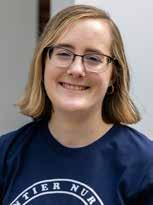
Olivia Fleming is majoring in psychology, creative writing, and English at Augustana College.
Olivia Fleming: I would recommend the Courier program to public health students because it positively changed my perspective on public health.
Before I started this internship, I thought people in the public health system were seen more as “numbers” and the most important people were the high-ranking doctors. Now, I realize how essential everyone is in regard to solving public health problems and that although there is a need for more empathy, everyone is a human being with their own challenges that need to be respected. The Courier Program taught me that I can make a difference without having a doctoral degree, and I think a lot of college students nowadays need to learn that. If you want to realize that you are more than just a number, I can’t recommend applying for this internship enough.
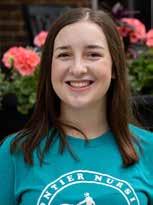
MacKenzie Schmeltz is a pre-med student majoring in biology at Washington & Jefferson College.
MacKenzie Schmeltz: to apply for this internship because I knew I could tailor it to my specific career aspirations by observing physicians while remaining in my hometown. Shadowing an Ear, Nose, and Throat specialist for several weeks in both the clinic and the operating room affirmed my passion for medicine as a whole, as well as the ENT specialty. The Courier program, along with the mission of FNU and my clinical experiences, have helped me define my personal philosophy on medical care and given me a clearer path on the impact I'd like to make in my community as a future physician.
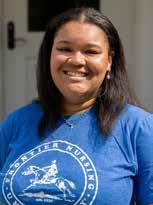
Kennedie Smith: My experience with the Courier program has awarded me the opportunity to interact with, observe, and serve diverse communities. I was exposed to a host of different individuals, built meaningful connections, and was able to witness the change organizations serving communities can make in someone’s life. I was fortunate to be able to volunteer with various groups targeting food stability, housing inequality, and maternalchild health. I was able to connect with so many professionals in these fields, and I was able to have meaningful conversations with the
individuals we were serving. I would wholeheartedly recommend this program to other students because it not only exposed me to different people and systems for health, it allowed me to identify what is most important to me in my career journey, and the numerous avenues available to improve the health and wellbeing of society and the individuals around us.
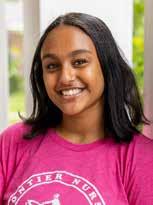
Peniel Tesfamichael: My experience with the Courier program was incredibly valuable and rewarding. I had the opportunity to shadow a registered dietitian at a Nova Physician Wellness Center, where I observed patient consultations and nutrition planning. I also completed food record research with Virginia Tech, which helped me better understand the connection between research, data analysis, and patient outcomes. These experiences gave me hands-on exposure to the healthcare field and deepened my appreciation for the role of nutrition in overall wellness. I would highly recommend this program to other students for its unique real-world experience, networking opportunities, and ability to explore different healthcare careers.
CHAIR
Marcus Osborne, MBA, Bentonville, AR
VICE CHAIR
Kerri Schuiling, PhD, CNM, FACNM, FAAN, Marquette, MI
SECRETARY
Nancy Hines, Shepherdsville, KY
TREASURER
Emma Metcalf, RN, MSN, CPHQ, Louisville, KY
Board Members
Elaine Bolle, BA, MBA, Chapel Hill, NC
William (Bill) Corley, MHA, Carmel, IN
Vernell DeWitty, Ph.D., MBA, RN, FAAN, Silver Spring, MD
Jean Johnson, Ph.D., RN, FAAN, Cabin John, MD
Marcus Osborne, MBA, Bentonville, AR
Tim Raderstorf, DNP, RN, FAAN, Columbus, OH
Peter Schwartz, MD, Port St. Lucie, FL
Maria Small, MD, MPH, Durham, NC
Michael Steinmetz, CPA, CMA, CSCA, Bellevue, WA
Foundation Board Members
Peter Coffin, Chair, BA, Chestnut Hill, MA
Derek Bonifer, MBA, BA, Louisville, KY
Constance Brotherton, MA, BA, Lexington, KY
Brooke A. Flinders, DNP, RN, APRN-CNM, FACNM, Lexington, KY
Peter Schwartz, MD, Port St. Lucie, FL
President Emerita
Dr. Susan Stone, CNM, DNSc, FAAN, FACNM
Distinguished Chair of Midwifery and Nursing
Board Members Emeritus
Wallace Campbell, Ph.D., Berea, KY
John Foley, BBA, Lexington, KY
Marion McCartney, CNM, FACNM, Washington, DC
Michael T. Rust, MPH, Louisville, KY
Nancy Fugate Woods, Ph.D., RN, FAAN, Seattle, WA
May Wykle, Ph.D., RN, FAAN, FGSA, Cleveland, OH
Mrs. Tia Andrew, Hamilton Parish, Bermuda
Ms. Sarah Bacon, Brooklyn, NY
Mrs. Andrea Begley, Hyden, KY
Dr. Heather Bernard, Hamilton, NY
Gov. Steven Beshear, Lexington, KY
Mrs. Betty Brown, Louisville, KY
Mrs. Amy Pennington Brudnicki, Richmond, KY
Dr. Timothy Bukowski, Chapel Hill, NC
Dr. Wallace Campbell, Berea, KY
Miss Anna Carey, Hyden, KY
Mrs. Jean Chapin, Oldwick, NJ
Mrs. Lois Cheston, Topsfield, MA
Mr. Bill Corley, Indianapolis, IN
Mrs. Julia Breckinridge Davis, Winston-Salem, NC
Mrs. Selby Ehrlich, Bedford, NY
Mrs. Robert Estill, Raleigh, NC
Mrs. Noel Smith Fernandez, Pomona, NY
Ms. Mary Ann Gill, Versailles, KY
Mr. John Grandin, Chestnut Hill, MA
Dr. Joyce Fortney Hamberg, Southgate, KY
Dr. Horace Henriques, Lyme, NH
Mr. & Mrs. John Hodge, Berwyn, PA
Mrs. Robin Frentz Isaacs, Lincoln, MA
Mrs. Rosemary Johnson, Versailles, KY
Mrs. Mary Carol Joseph, Hyden, KY
Ms. Deborah M. King, Westport, MA
Mrs. Patricia Lawrence, Westwood, MA
Mrs. Marian Leibold, Cincinnati, OH
Dr. Ruth Lubic, Washington, DC
Mr. Robert Montague, JD, Urbanna, VA
Dr. Judy Myers, Ph.D., RN, New Albany, IN
Ms. Barbara Napier, Irvine, KY
Ms. Sandra Napier, Stinnett, KY
Mr. Dean Osborne, Hyden, KY
Mrs. Helen Rentch, Midway, KY
Mrs. John Richardson, Washington, DC
Mrs. Linda Roach, Lexington, KY
Mrs. Georgia Rodes, Lexington, KY
Mrs. Sandra Schreiber, Louisville, KY
Dr. Maria Small, MD, MPH, Durham, NC
Mrs. Sherrie Rice Smith, Franklin, WI
Mrs. Austin Smithers, Lyme, NH
Mrs. Robert Steck, Arlington, MA
Mrs. Mary Clay Stites, Louisville, KY
Mr. Richard Sturgill, Paris, KY
Ms. Mary Frazier Vaughan, Lexington, KY
Mrs. LouAnne Roberts Verrier, Austin, TX
Dr. Patience White, Bethesda, MD
Ms. Vaughda Wooten, Hyden, KY
The following people gave contributions to Frontier in memory of their friends or loved ones. The names in bold are the deceased.
Michael Carter
Donald and Nancy Kennedy
Dave Rota
Harriette Sherman
Mary Ann Barnes
Ronald Szpala
Lannette Marie Fetzer
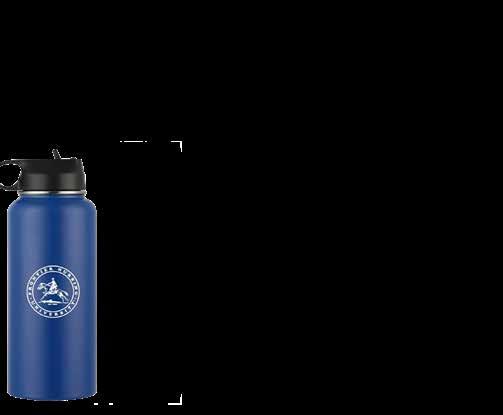
We are looking to spotlight FNU community members in our blog! Tell us your story by scanning the QR code and filling out the form or email stories@frontier.edu. Then, someone will contact you soon. These spotlight stories help us shine a light on all of the amazing accomplishments and the impact our community members have on their home communities and the University community.

FNU@frontier.edu • 859.251.4700 frontier.edu Do you have a new mailing or email address?
Please